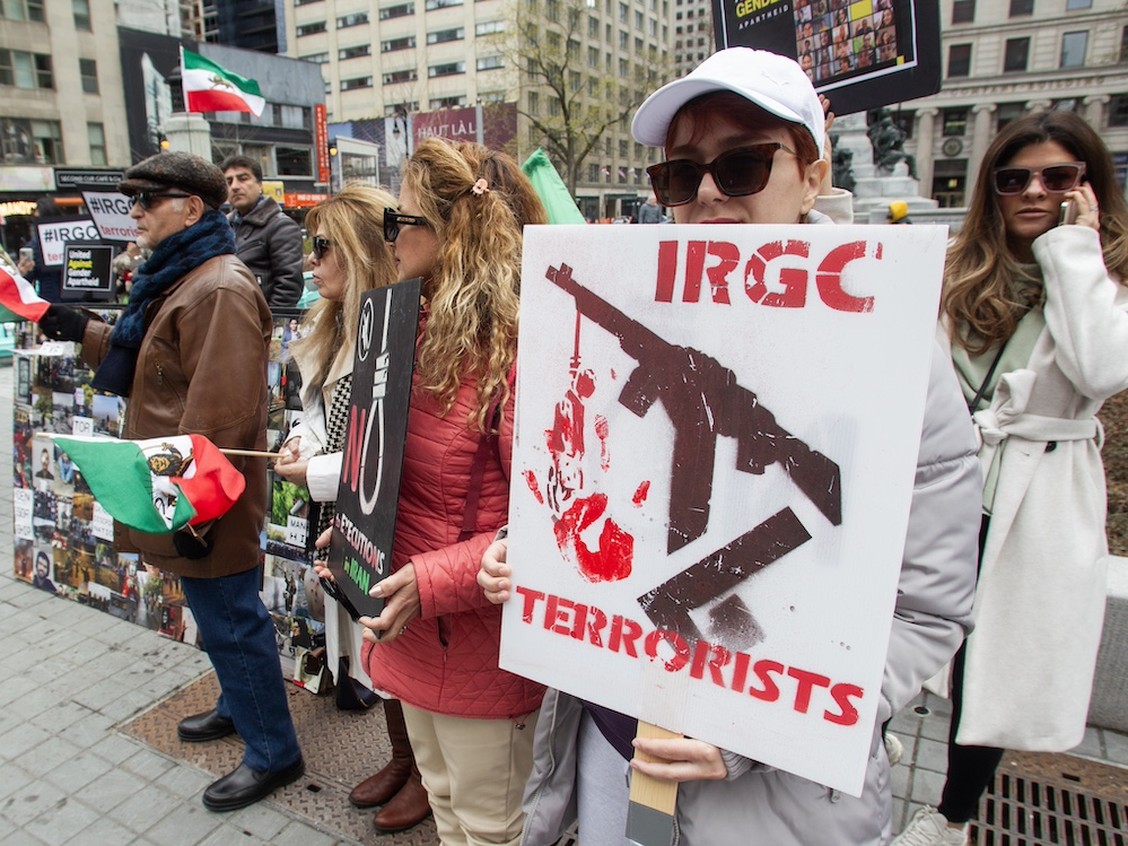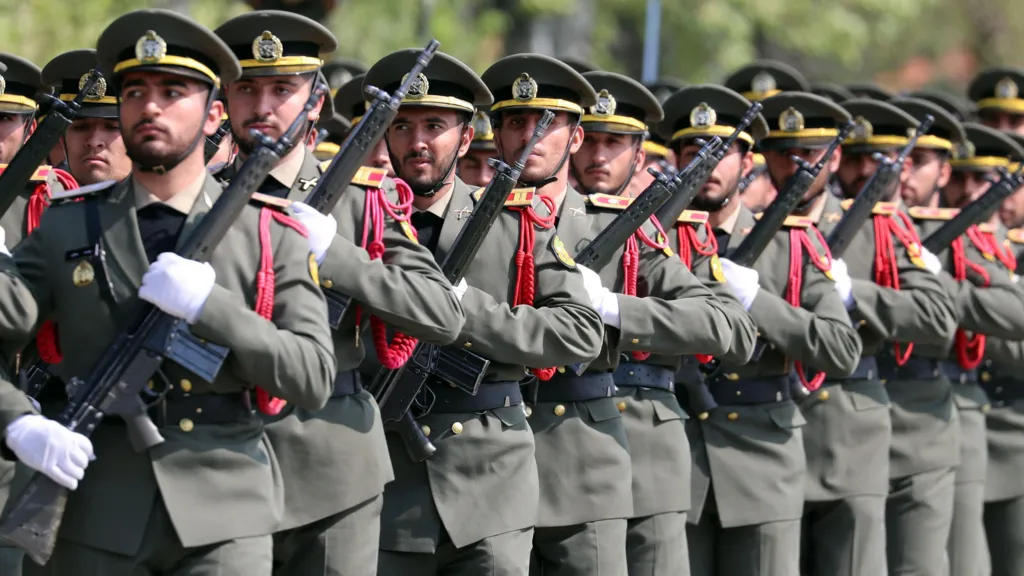Outlawing the Islamic Revolutionary Guard Corps/Terrorist Central
"It's influencing the political and the social landscape of Canada. It's influencing the youth and mobilizing them against Western values against Canadian security, in very subtle ways and sometimes in very overt ways.""It's the same issue with respect to China, how they have been operating. The Islamic Republic is no different.""In terms of the evidence before the Liberal government, nothing substantial has changed since six years ago. We all know that in 2020 the IRGC shot down [Ukrainian Airlines] PS752, killing all 175 passengers, including 55 Canadian citizens. If that wasn't sufficient evidence, I don't know what else the Liberal government was looking for.""We welcome the change in the government's attitude after six years of not doing anything about it and giving all sorts of excuses why they were not listing IRGC as a terrorist entity despite all the evidence that they admitted existed. The evidence was there. It was just a question of political will.""[Six years of inaction has allowed the IRGC to] spread their tentacles in Canada. Their numbers have increased. Their influence has increased. We are going to feel that influence and the impact of them being in Canada and within our systems and institutions for decades to come."Mojdeh Shahriari, Vancouver human rights lawyer, co-founder, Stop IRGC
 |
| People take part in a a protest against the Iranian government on April 21 in Montreal (John Kenney / MONTREAL GAZETTE) |
In
1976 when Ayatollah Ruhollah Khomeini returned from exile in France to
head a revolution that removed the Shah of Iran from power, in turn
installing a theocratic regime with himself at its head, it was
understood that a fundamentalist Islamist Shiite government had taken
power in the country, with Khomeini as its Supreme Leader. Despite
which, the extent of the reach of the Islamic Republic of Iran since
that time in influencing Middle East affairs and international relations
far afield might never have been imagined.
In
the close aftermath of the revolutionary change in government in Iran,
many Iranians knew they could not remain in their country of birth. From
a fairly open society, with good international relations with
non-Muslim countries -- including Israel -- the Islamic Republic was
destined to become a divisive power broker in the Middle East. Under the
ruling Ayatollahs and their Islamic Republican Guard Corps the
intention was to restore Iran to its historical influence as the supreme
regional power.
In
the predominately Arab Muslim Middle East, Iranians, though Muslim, are
not Arab but Persians, the Aryans that Adolf Hitler was adamant were a
superior 'race'. There is also a sectarian divide between Iran and the
other Muslim countries of the Middle East which are majority Sunni
Muslim, while Iran is Shiite, a relative minority. From its very
inception in 1976 the Islamic Republic set out to gain a commanding
influence within the Middle East, and to elevate the status of Shiite
Islam. An unsubtle state of confrontation between Iran and Sunni Saudi
Arabia ensued.
Iran's
ambitions rose to challenge Saudi Arabia as custodian of the holy
cities of Mecca and Medina in its aspirations to become the supreme
Islamic authority commanding the Middle East. Iran's animus toward the
Jewish State of Israel surpassed that of any Arab state by a wide
margin. And Iran courted the disaffected populations of minority-status
Shiites in Arab countries. The al-Quds division of the IRGC founded an
Islamist Shiite group in Lebanon, training and arming it as a proxy
militant arm it could control.
 |
| The IRGC is a major military, political and economic force in Iran EPA |
Hezbollah
came to world notice when in 1983 it undertook a truck-suicide bombing
on an American military base, a marine corps barracks in Beirut against
UN-affiliated peace envoys, killing 241 American soldiers. Another
suicide bomber soon afterward killed 58 French UN-assigned paratroopers.
This was Hezbollah, a newly-minted terrorist group, doing the bidding
of its masterminds in Tehran. Since that time, Hezbollah has been a
terror-creation of Iran, tasked to do its bidding, with a major focus on
Israel, and on suicide-mission attacks abroad on Jewish enclaves.
There
is also a Western infiltration component to the Islamic Republic's
aspiration for dominance. Those Iranians who fled a revolutionary
Islamist Iran they had no wish to live within, have found themselves, in
the past decade, being targeted for their anti-Islamist,
anti-Ayatollah, anti-terrorist attitudes. The Trudeau government in
Canada has allowed the infiltration of Iranian agents and personnel,
including senior leaders of the IRGC to have easy access to Canadian
society at all levels, to enter on visas, to establish residency and to
undermine the democratic freedoms of the Iranian expatriate population.
Their
scheme in Canada, as it is elsewhere in the free world, is to
destabilize all the institutions that make the West a free world,
undermining the social and cultural values of nations of the West.
Although Iranian-Canadians have made it clear to the Trudeau government
that they have reason to fear the entry of representatives of the
Iranian regime to Canada who intimidate and threaten them, the very fact
that those involved in the most extremes of human rights abuses have
entry to Canada is in and of itself inexcusable.
Finally,
although all parties in Canada's Parliament have long supported a move
to outlaw the presence of Iranian regime representatives in Canada, on a
number of occasions voting unanimously to place them on a terror list
and impose sanctions, the Trudeau government chose not to take
appropriate action. Until last week, when it finally did. "Based
on their actions, there are reasonable grounds to believe that the IRGC
has knowingly carried out, attempted to carry out, participated in or
facilitated a terrorist activity", explained the government's minister of public safety. Stating something that has long been known.
"This process of IRGC spreading its influence throughout the Western world has been going for a very long time, unfortunately, and they have been able to infiltrate many of our academic institutions, our professional institutions and they have been money-laundering [in Canada].""Everyone is looking for an assassination plot or something like that, and of course they do that, and they are known for it and their terrorist activities all over the world, but they have been infiltrating and interfering with our institutions for decades and in the past six years this has intensified.""So it has been a huge disaster, in my view. In 2018, Parliament unanimously voted to immediately list the IRGC and I never heard any reasonable explanation from the Liberal government why they were dragging their feet. Something political has changed for them in terms of their calculation of the cost benefit of listing the IRGC."Mojdeh Shahriari, Vancouver human rights lawyer
 |
| Members of the Revolutionary Guards attend a parliamentary session in Tehran. Atta Kenare/AFP/Getty Images |
Labels: Canada, Hamas, Hezbollah, Houthis, Intimidation, Islamic Republic of Iran, Islamic Revolutionary Guard Corps, Sanctions Suicide Bombing, Terror List, Threats, World Terrorism

<< Home